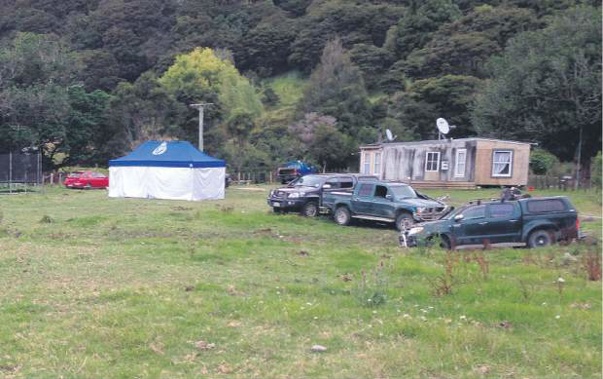
Two men who claimed it was self-defence after one of them shot dead East Coast gang boss Tumanako Tauhore with a high-powered rifle have been cleared of charges against them.
A High Court jury in Gisborne took less than four hours to decide Roderick Bully Cooper, 31, was not guilty of murder and Wiremu Joseph Gary Gladstone, 33, was not guilty of recklessly discharging a .22 rifle during the same incident at Te Araroa on February 16 last year.
The men, who each have young families with long-term partners, are free to return to their lives. Their supporters wept with joy.
The jury’s deliberation time included lunch and about an hour listening again to part of the evidence — a police DVD interview with Mr Cooper immediately after the incident and a recorded 111 call made by one of Mr Cooper’s neighbours during it.
The trial, presided over by Justice Robert Dobson, started last week, with courthouse security staff on high alert throughout.
The public gallery was full every day with people from each of the three families — many of whom were inter-related. At least 20 of Mr Cooper’s supporters travelled from overseas.
While the atmosphere was relatively calm most days, yesterday saw tempers fray and tensions running higher. The judge and security staff warned family members to control their emotions.
Additional police support was stationed at the court.
The replay of evidence was interrupted in the afternoon when the public gallery was cleared by security staff and everyone was put through another security check.
Mr Cooper claimed self-defence immediately after the incident, saying he acted to protect himself, three other adults (including Gladstone) and seven children at the isolated rural property.
The oldest of those children was Mr Tauhore’s 16-year-old stepdaughter, who lived with Mr Gladstone and his partner — a cousin of Mr Tauhore’s partner.
Mr Tauhore arrived in an agitated state at Mr Cooper’s rural property at about 7pm. His four-year-old daughter, who he left in the car, waved to children she knew on a trampoline in front of the house. Mr Tauhore stormed across a field towards the house, apparently looking for Mr Gladstone who had made drunken comments at a horse sports event two days earlier.
He was yelling taunts that he was coming to get them and threatened to kill at least Mr Gladstone.
Several of his patched Mangu Kahu gang cohort followed him on to the property — three claiming in court they weren’t sure why they were there but could tell Mr Tauhore was angry and were willing to back him.
Crown prosecutors Steve Manning and Rebecca Guthrie told jurors to consider whether Mr Cooper intended to shoot Mr Tauhore and whether his use of such lethal force was justified in the circumstances as believed to exist that evening.
Could he not have taken some other course of action?
Jurors should put aside any feelings of sympathy or prejudice and it was easy to excite prejudice with the mere mention of a gang member. But Mr Tauhore was also a father, partner and no doubt a friend. He was not there to speak for himself, Mr Manning said.
Mr Cooper’s counsel Russell Fairbrother QC (assisted by local barrister Nicola Wright) and Mr Gladstone’s counsel Tiana Epati, each pointed to the lack of available egress for the group at the house. Mr Tauhore’s car, flanked by two other gang vehicles, was blocking the driveway.
Steep hills surrounded the back and one side of the house, and a creek to the side obstructed the route to a neighbouring marae site. There was no easily-negotiated alternative route off the property especially for children, one of which was Mr Cooper’s nine month-old baby, and Mr Gladstone’s partner who was more than eight months pregnant.
Witnesses at the house said they were terrified. Mr Tauhore’s reputation for violence and intimidation preceded him.
Mr Tauhore had a fully tattooed face. Formerly the president of the Nomads gang in the Wairarapa-Horowhenua area, he earned the names "Madness" and "The Enforcer", Mr Fairbrother said.
He was yelling taunts and threatening to kill at least Mr Gladstone as he neared the house. The women and children were screaming.
Mr Fairbrother said that as a responsible, family man Mr Cooper acted with urgency in the face of primal fear.
The .270 rifle used by Mr Cooper was the only weapon available to him. It was brought to the house earlier that evening by a friend to shoot a horse.
There was no reliable evidence of Mr Cooper having actually taken aim with the bolt action rifle, Mr Fairbrother said.
Mr Gladstone had already taken to the hill behind the house with Mr Cooper’s .22 rifle.
He, too, immediately claimed self-defence — saying he fired only aerial shots into trees on top of the hill to warn off the gang group. He was a good shot and at a vantage point where he might otherwise have easily been able to hit several of the gang members.
The .22 was fitted with a silencer. One witness at the scene likened its noise when fired to nothing more than a firecracker.
Rather than dissuade Mr Tauhore from entering the property, the warning shots from the .22 seemed to aggravate him and sped up his advance.
It was not until Mr Cooper fired the larger rifle twice that the gang finally retreated.
Mr Gladstone’s partner had tried to alert police to the brewing situation earlier that day but received little real support.
The sole-charge police officer for the large policing district was not made aware of her earlier concern until after the shooting occurred. It took an hour and a half before another officer was in Te Araroa to assist him.
Take your Radio, Podcasts and Music with you









